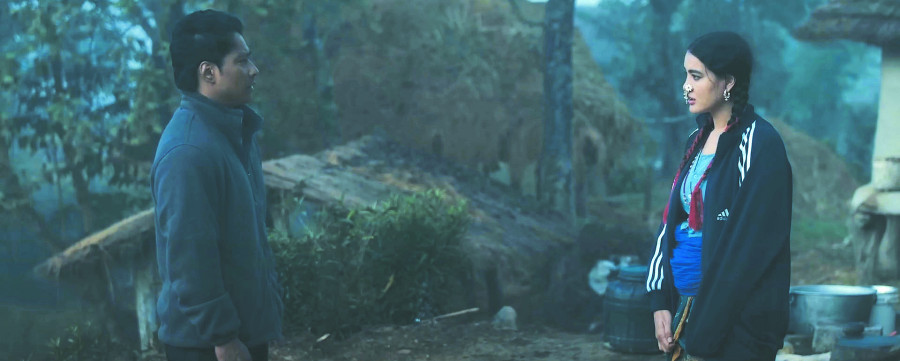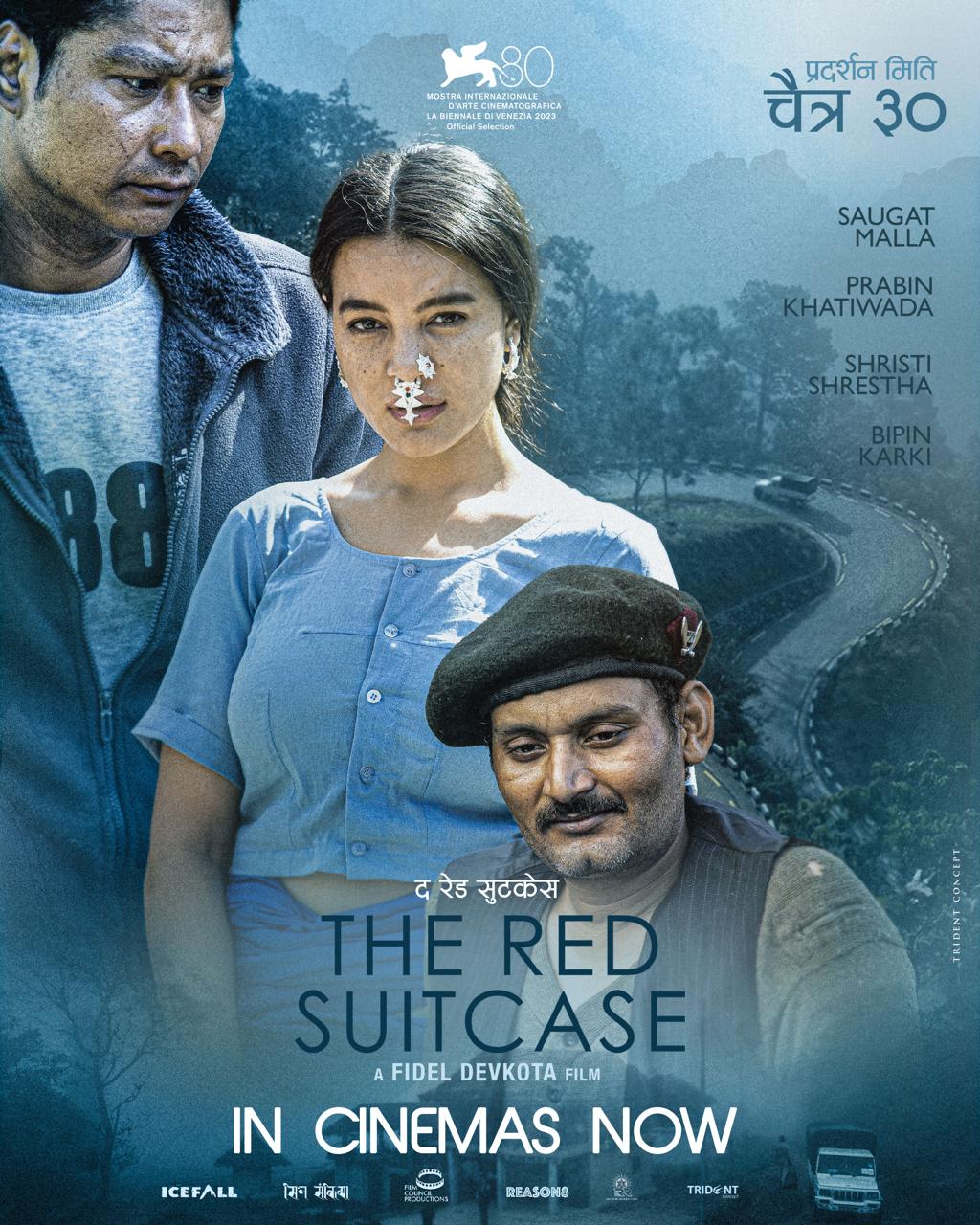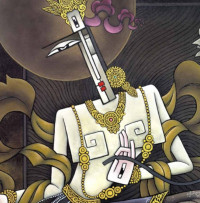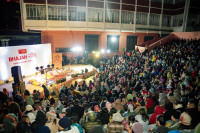Culture & Lifestyle
Mourning for the returnee
‘The Red Suitcase’, a poignant political allegory echoing the woes of Nepali youths, explores themes of loss, migration and hope.
Deepali Shrestha
There are rare moments when a film keeps you in the theatre long after it ends. During such instances, the imaginary wall between the characters and the viewers dissolves, and you need some time to process everything you experienced during the one or two hours you sat staring at the silver screen.
‘The Red Suitcase’, filmmaker and visual anthropologist Fidel Devkota’s feature directorial debut, slows down time, allowing you to think, question and process, and above all, to forget about whatever you have scheduled after the film for a brief moment. The internationally acclaimed film finally began its homecoming last week on New Year’s Eve after it world premiered in the Venice Film Festival’s Horizons strand and got selected at the Mannheim-Heidelberg International Film Festival, the Zurich Film Festival and the Mumbai Film Festival. According to the UK-based sales agent Reason8 Films, HBO has purchased the film's OTT rights for 15 European countries.
‘The Red Suitcase’ has the kind of innovative storytelling which Nepali cinephiles have wished to see in Nepali films for a long time. It’s a film that is clear about its message and impact, which seems unforced and uses magical realism as its modus operandi, depicting the effects of political instability, migration, and death in Nepali societies, where remittances sent by migrant workers is the fuel that runs the country.
Saugat Malla is the pickup truck driver who embarks on a solitary journey through the treacherous winding roads, the fertile, foggy plains and shallow rivers to a remote village called Bheyul to deliver a casket from Qatar that has arrived in Kathmandu with a peculiar companion: A red suitcase. The dead body inside the casket is of Dhan Bahadur BK (Prabin Khatiwada), who is the fictional representation of one among over 2100 Nepali migrant workers who have died in Qatar since 2010, the year it won the World Cup hosting rights.
When the jeep breaks down in the middle of the road, a crevice forms in the driver’s reality, blurring the boundaries between normal and paranormal. A mysterious figure (Bipin Karki), with piercing black eyes devoid of emotions, suddenly appears and urges him to stop at his roadside teashop for the night, to which the driver ultimately complies after hesitating breifly.
The face-to-face table conversation between the two strangers occupies much of the film’s 87 minutes. As they gradually find comfort with successive sips of their drinks, the haunting memories of the past emerge akin to the lingering bitter aftertaste of low-quality alcohol. The driver recounts his gruesome near-death experience in the Maoist insurgency and the fateful turn of events leading him to take up his job as a deliverer of caskets, whereas the mysterious teashop owner mentions briefly about his time in the Jammu and Kashmir war as a lahure.
The inspiration for this scene emerged when Devkota watched ‘Grass’, a 66-minute film by a revered South Korean director, Hong Sang-soo. The film’s singular focus on dialogue-driven storytelling through the conversations between the characters in a cafe captivated Devkota, compelling him to create something similar in his film.
Having directed documentaries like ‘The Last Yak Herder of Dhe’ (2014) and ‘Wind of Change in Lo Mustang’ (2016), Devkota has worked extensively as a visual anthropologist in the Himalayan region. This lens is evident in the film as it incorporates subtleties of individual characters’ behaviour and their relationship with their culture, environment, society, etc, allowing the viewers to immerse themselves in their way of life. The scene where the driver burns incense sticks in front of the mirror hung among thousands of others on a highway slope, or when he purifies his car after delivering the casket, portray such nuances.

One of the most striking parts of the films is the visuals that are crisp in their symmetry, angle, lighting and colour. Sushan Prajapati, the films’ director of photography (DoP), has done a commendable job in materialising Devkota’s vision through spine-chilling, emotionally rich visuals whose compositions hit the right spot. The use of split light, which lights up half of the face and leaves the other in shadow and the occasional Rembrandt light, where a small inverted triangle of light is placed below the subject’s eye, on the ex-lahure during the conversation between him and the driver adds an atmosphere of eeriness and duality in his character. In this way, much of the character’s story has been conveyed through the visuals, as the creators have skillfully played around with colours and lights.
A scene halfway through the film leaves an indelible mark on the viewers. After Dhane embraces his daughter, he rests his head on the lap of his wife (Shristi Shrestha) and gazes at her with lifeless eyes, his naked body illuminated in the moonlight. His wife looks at him, her eyes exuding warmth and affection, as he kisses her hands. This is where the makers have created magic. Every element in the scenes’ frame is filled with imagery that is heavy with sentiments and the colours perfectly express the mood. The pain and the love the characters feel in seeing and embracing each other after so long is palpable. The scene speaks volumes even as characters opt for silence.
Devkota has brilliantly employed the element of Chekov’s gun in his storytelling, making the viewers admire his technique as the narrative puzzle starts to come together. As the story normalises the bizarre occurrences, it leaves visual and narrative cues to grasp the subtext. Whether it be the scene where the driver hands money to the ex-lahure and he refuses by saying, “The money is just a piece of paper for me at this stage”, or the haunting hollowness in the eyes of Dhane and the tea shop owner, these elements bring an air of ominous anticipation, foreshadowing future events.
A few things in the film weren’t benefiting its narrative. As the story revolves around death, portrayed predominantly through magical realism, the film would have been more gripping had the narrative been less predictable. Moreover, some dialogues of the ex-lahure didn’t register well in the film. Certain lines felt a bit preachy and deviated from the film’s rhythm, such as the scene where he said that the driver should be saluted for his work. Overall, the actors understood their assignment and poured their souls into their characters, who were journeying through various emotional dilemmas. Saugat Malla is effortlessly good in every scene, and this could easily be one of his best performances so far.
With the birth of new and experimental film, there is always a concern regarding its appeal to the average Nepali audience who gravitate towards cinemas for entertainment and escapism. Films like ‘The Red Suitcase’ might not be the cup of tea of those who want to forget about their troubles and get thoroughly entertained in the cinemas. However, influential entities like the QFX must support such innovative films and refrain from reinforcing this notion. Cultivating film literacy doesn’t happen over night and Nepali viewers should be gradually exposed to such films. Furthermore, it is also the makers' responsibility to ensure that their art reaches and resonates with the community that it represents.
‘The Red Suitcase’ has mastered several cinematic elements and crafted a poignant political allegory echoing the woes of youths, especially in rural Nepal, where neither swadesh nor bidesh offers a sanctuary for the realisation of their bare minimal dreams and desires. When the driver finally receives signals in his phone after he delivers Dhane’s casket, he continuously gets phone calls, indicating that several Dhanes, with crushed hopes and dark secrets, are waiting in a long queue to reunite with their loved ones. All that remains is a red suitcase, once sheltering dreams of reunion and familial warmth, now a heavy void. Perhaps this symbolises the metamorphosis of our nation, turning into an echoing abyss with each passing day.
The Red Suitcase
Director: Fidel Devkota
Cast: Saugat Malla, Shristi Shrestha, Prabin Khatiwada, Bipin Karki, Anju Deuja, Sonam Lama, B Bishwokarma
Language: Nepali
Year: 2023
Duration: 1 hour 27 minutes




 14.12°C Kathmandu
14.12°C Kathmandu.jpg)















